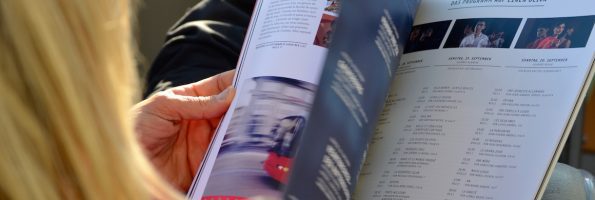Georgia Tech’s Full-Time MBA Recruiter Answers Our 5 Questions

In our latest installment of the MetroMBA “5 Questions” series, we speak with Amy Hayes, Full-Time MBA Recruiter at the Georgia Tech Scheller College of Business. Hayes talks about what makes an ideal Georgia Tech MBA candidate, what to know before applying, and much more, below.
1.) What Advantages Does a GT Scheller MBA Have Compared to Other Offerings in Georgia?
“What makes Georgia Tech Scheller College of Business stand out is the way our curriculum and experiential learning opportunities explore the intersection of business and technology. Many of our students do come from a technical educational and professional background; however, we have nearly as many who don’t. All students are looking to address gaps, in technology or business acumen or both, to prepare to pivot into a new career or to gain a better framework for decision-making. In other words, our program is approachable no matter your background is. Our aim is to produce MBAs who understand how technology drives innovation in any industry. A general understanding of technology’s power is vital to any role. While many of our students take a broad approach to our flexible curriculum, we offer concentrations in seven functional areas and nine interdisciplinary areas that often draw students into our flagship coursework in Business Analytics, Strategic Sustainability, Marketing, Supply Chain and Innovation.
Additionally, Scheller is located not just in Atlanta, but specifically in Midtown Atlanta’s Technology Square. Our students benefit from an innovative ecosystem comprised of major global corporations, emerging tech companies, and many corporate innovation centers strategically placed to draw from Georgia Tech talent. This location positions students well with opportunities advantageous for networking. Among our extraordinary 12 practicum offerings, students are not only partnered with companies based outside of Atlanta (including Nike, IHG, Bank of America, Samsung, AT&T) but also work with neighboring businesses where there is opportunity to meet face to face regularly with executives of these organizations (including Coca-Cola, Delta Air Lines, The Home Depot, NCR).”
2.) Is There a “Perfect” Kind of Candidate That Fits the School’s MBA Mold?
“Actually, we prefer to look at how a candidate can break the mold. What is it about your experience, your background, your career goals that will bring a diverse perspective to our program? Sure, we aim to bring in students who can be successful in the classroom and who we can successfully serve in terms of career placement, but I feel lucky to get to recruit prospective candidates with different stories and unique individuals to Scheller. Given our small program size of around 160 students, we have a tight-knit, collaborative community that commands intentionality in finding bright candidates with good character, great personalities, open-mindedness, and willingness to help others. I’m certainly held accountable by our current students to uphold our values in the recruiting process, and I wouldn’t have it any other way. I love that they have a vested interest in who they will work and play alongside!”
3.) What Would You Say Students Need to Prioritize the Most Before Applying?
“I think as much as anyone dreads standardized testing, applicants should know that your performance on the GRE or GMAT is the one application area you can impact the most. Transcripts from undergrad are set in stone, and your work experience is what it is. Intentionally preparing for the GRE or GMAT and planning to test multiple times will not only help you achieve better results for admission and funding but might also set you up for better job placement as some industries will evaluate these scores in recruiting. When considering full-time MBA programs, it’s best to approach the testing phase with determination instead of dread.”

4.) What Would You Say Applicants Need to Worry Less About Before Applying?
“My recommendation is to worry less about exact courses you will take and mapping your MBA experience out before you get here. Having some degree of clarity about career goals and how certain classes or experiences within a program will help you get there is great to highlight in essays and interviews, but you should also be open-minded. Curiosity is a very attractive quality when we’re evaluating candidates at Scheller; and, I’m sure many programs would say the same. You’ll receive wonderful advising when you get to our program pertaining to curriculum and career goals. We find our candidates who are flexible and join clubs or take classes in areas they didn’t know they’d be interested in have the best experiences and see the most success in the long run.”
5.) If You Had to Choose One Book for a Potential GT Scheller MBA to Read Before Enrolling, What Would It Be?
“I would recommend Grit: The Power of Passion and Perseverance by Angela Duckworth. It would be beneficial both in applying to business schools and in preparing to start business school as it contends that the best thing to arm yourself with is resilience. The application process is a journey in finding the best fit for you and you might have disappointments and new information coming to you that could shift the course you’ve charted for yourself. Your “dream school” might change. And, your business school journey might bring big challenges early on as you navigate the transition back into the classroom, are tested in your quest for a summer internship, and enter a world in which feedback freely flows from your classmates, career advisors, faculty, and even acquaintances. Your MBA experience will stretch you, but the return on your hard work will come in the ability to receive coaching and the perseverance you’ll carry with you throughout your career.”
Better Advice, Getting Kids To Stop Drinking Soda, and More – Chicago

Let’s explore some of the most interesting stories that have emerged from Chicago business schools this week.
A New Way to Persuade Kids to Drink More Water and Less Soda – Kellogg Insight
Northwestern University’s Kellogg School of Business recently published an article that surveyed a number of strategies that Associate Professor of Marketing Michal Maimaran and his colleagues pursued in collaboration with UNICEF to encourage children to drink more water and less soda.
Maimaran, Stanford’s Szu-chi Huang, BU Questrom’s Daniella Kupor, and the University of Amsterdam’s Andrea Weihrauch attempted to link “water consumption with different goals that kids might want to achieve” by designing four “Drink Water” posters, each with a distinct message: “Be Healthy,” “Learn Faster,” “Make Friends,” and no message.
According to the research, the only poster that spurred bottled-water sales was “Be Healthy,” which Maimaran believes is likely due to the fact that “kids are persuaded by messages that rely on a natural association between the action and goal, such as between being healthy and water.”
You can read more about the research here.
Capitalizing On Sleep-Wake Cycle Can Drastically Increase Digital Ad Profits From Social Media – Mendoza Ideas & News
Recent research from the Notre Dame University Mendoza College of Business shows that “digital content platforms can increase traffic to their websites from social media and boost digital ad profits simply by aligning their posting schedules with target audiences’ sleep-wake cycles, or circadian rhythms.”
Vamsi Kanuri, Assistant Professor of Marketing at Mendoza explains in his new research that, “Consumers engage more with posts containing high-arousal negative information, including anger, stress, anxiety or fear, in the morning than in the afternoon or evening. They engage more with ‘boosted’ (paid to advertise) posts and those requiring higher cognitive processing, such as op-eds or scientific material, in the afternoon.”
“Scheduling Content on Social Media: Theory, Evidence and Application” is due for publication in the Journal of Marketing soon. You can also find more on the research from Mendoza Ideas & News here.
Why is it Better to Give Advice Than Receive It? – Chicago Booth News

Chicago Booth Professor Ayelet Fishbach
A new study from and Penn’s Lauren Eskries-Winkler and Christopher H. Browne Distinguished Professor of Psychology and famed writer Angela Duckworth found that people tend to “benefit more from giving advice than receiving it.”
According to the study, which was recently discussed in the Chicago Booth News, “the very act of giving the advice makes the giver feel powerful and confident. When people lack motivation, receiving advice may actually be harmful … because it undermines feelings of competence.”
The authors note, “In the process of giving advice, advisers may form specific intentions and lay out concrete plans of action—both of which increase motivation and achievement.”
“We hope our findings, which illuminate the motivational power of giving, do just that: goad scientists and practitioners to consider the ways in which struggling individuals benefit from giving.”
“In Giving We Receive: A Counterintuitive Approach to Motivating Behavior” is due for publication in Psychological Science.
You can read the full article from the Chicago Booth News here.
5 Questions with Sacred Heart’s Exec. Director of Graduate Admissions Pam Pillo

In the newest installment of the MetromBA “5 Questions” series, we spoke with Jack Welch College of Business Executive Director of Graduate Admissions Pam Pillo about the future of the Connecticut business school, and much more.
What are you most excited about regarding the future of the Sacred Heart MBA Program?
“Next fall, Sacred Heart University’s Jack Welch College of Business will move to the new West Campus, formerly General Electric’s global headquarters. The facility will include more classrooms and facilities for faculty and students, including a finance lab, artificial intelligence and innovation facilities. The incubator space will allow students, in conjunction with investors and area businesses to develop their creative ideas for new products and programs. The Welch College of Business is vested in the success of our students and continued success of the region. The new campus will serve as an active pipeline for skilled workers to meet the needs of today’s rapidly evolving economy.”
What is a unique selling point of your school that some people may not be aware of?
“The Welch College of Business offers a personalized experience. Full-time faculty and staff are dedicated to meeting the needs of students. Classes operate on a 15:1 student faculty ratio. The Welch MBA also collaborates with area corporations including Subway, People’s Bank, Edgewell Personal Care, and Diageo to name a few. Students apply business concepts through the development of a business plan to promote a product or service both domestically and internationally.”
What parts of the MBA program should more students know about before starting their graduate school career?
“The Welch MBA features a team-based approach through the Integrated Core portion of the curriculum. A key competency developed in the Welch MBA is accountability for decisions and actions of team and self, putting team goals ahead of individual goals, with the focus on contribution to the organization.”

Jack Welch MBAs collaborate with local companies, such as Subway, People’s Bank, and Edgewell Personal Care.
What kind of students would you say your business school is most interested in?
“The Welch MBA encourages students from various academic and professional backgrounds.”
What was the last book you loved?
“Grit by Angela Duckworth”
You can check out Duckworth’s TedTalk on her work below.
Click here for more information on the Sacred Heart Jack Welch College of Business graduate admissions.
Rotman Management Magazine Celebrates 10 Years

Since 2007, the Rotman School of Management at the University of Toronto has provided thought leadership and management insight in the form of the Rotman Management magazine. Now, with its thirtieth issue out this spring, the magazine is celebrating ten years of bringing readers insightful articles and topics from experts in the areas of business, economics, psychology, design thinking and more. Continue reading…
